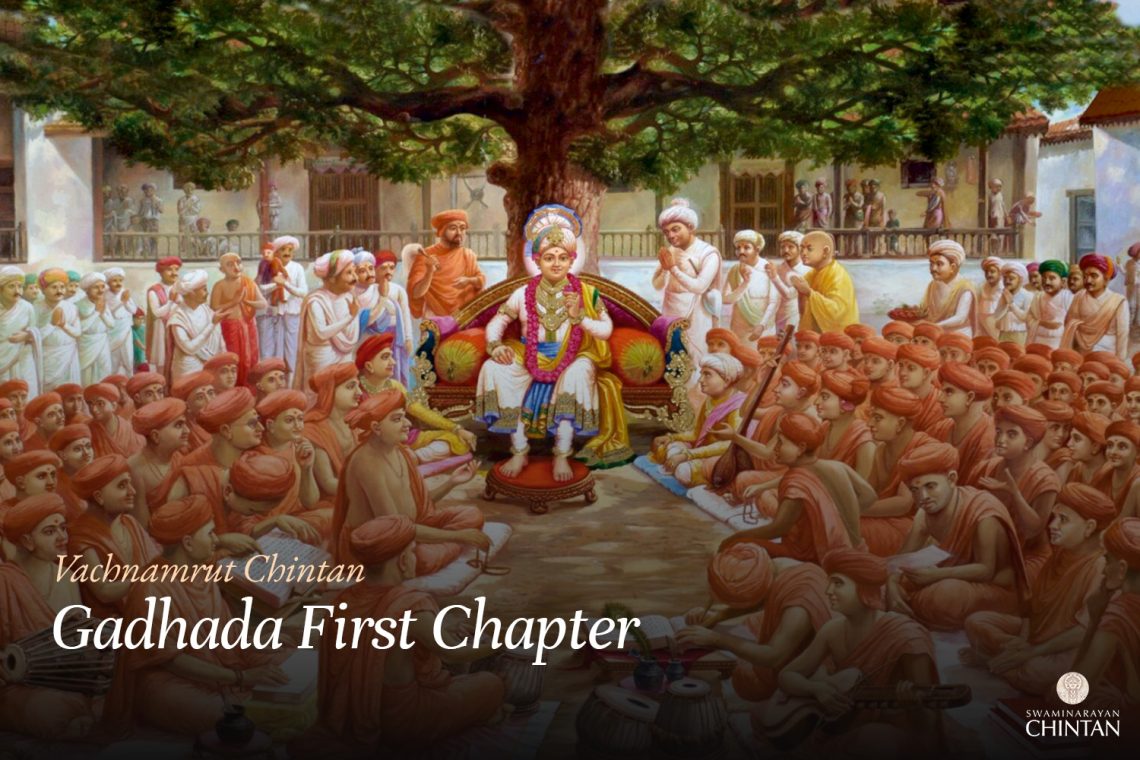Central Insights:
- Devotees must be able to distinguish between genuine and false deeds.
Key Points:
- Humble devotees perceive deficiencies in themselves and virtues in devotees and saints.
Explanation
The word Vivek (wisdom) is used in the meaning of विचिर् पृथकभावे विच् vichir pṛthakabhāve vich; it is originated from ‘Vich’ it means segmentation/differentiation. The one who differentiates is Vivek, and the one who has the power to differentiate is called viveki. In the current passage, Shreeji Maharaj initiates the discussion by describing a scenario where one should be able to differentiate between the body and soul. Such differentiation ultimately enables one to distinguish between right and wrong, mortal and immortal. For achieving salvation, the differentiation of harmful and beneficial actions is necessary. The analytical brain plays an important role in evaluating or differentiation in the context of time, place, and company.
Here, Vivek is used in the context of hit (beneficial) and ahit (harmful). When people join the Satsaṅg, they are eager and enthusiastic about the path of salvation but lack Vivek (discretion) of hit and ahit. Thus, devotees do not derive the right result. Here Maharaj talks about Vivek.
Shreeji Maharaj has said that the one who is Vivek in Satsaṅg sees vices/faults about himself and virtues in other devotees. This is beneficial to oneself. Finding one’s vices and taking the virtue of others does not mean that one’s virtues do not exist and others do not have vices. In reality, we have virtues, but it is not beneficial in pondering upon virtues. That is for sure. Because contemplating one’s own virtues leads to pride, arrogance and contempt for oneself and others. So it is reality; But not beneficial. Things are different on the spiritual path. Not all realities are beneficial. In the same way, taking the virtue of another does not mean that there is no vice in Satsaṅg, but it is to our detriment to think of the faults of others. Therefore, it is Vivek – to embrace the thing which is beneficial to oneself and give up the thing which is not beneficial.
It feels very bad and bitter to listen to one’s own faults, and it feels very bad to take or listen to the virtues of others. So not everyone can walk on this path. Also, taking one’s own merits seems very sweet and delicious and taking the vices of others seems very far-fetched. There is an instinct in all such human beings. Then whether he is a devotee or a non-devotee, the same is true. Only by removing it with effort can one attain Moksha. Therefore, the things that are said in this Vachanāmrut are for the benefit of spirituality.
It is said that the Swans have the innate ability to separate water from milk and drink only milk. This is his supernatural power. Someone told Swans that you really have a wonderful virtue! You have milk by separating it from water; it’s really appreciable. Swans then give him a very nice answer that what you say is true, but I don’t need you to appreciate me for this. The separation which I do is for my livelihood. This virtue is the basis of my life and my livelihood. Swans gave a very nice answer that a devotee of God needs to think about this thing. Taking virtue from others is necessary for one’s own upliftment, not for the upliftment of others. So there is nothing to be proud of. Therefore, find vices in oneself and the virtues in others as well as respect the preachings of saints. This will surely result in the upliftment of oneself in Satsaṅg.
Glossary
| Ahit – Harmful That which causes spiritual downfall; viveki avoids ahit even if it seems outwardly beneficial. |
| Hit – Beneficial That which helps in progressing towards moksha; recognizing hit leads to right choices in life. |
| Moksha – Salvation The ultimate liberation of the soul from the cycle of birth and death and reaching divine abode of God |
| Satsang – Holy Fellowship Association with saints and devotees that purifies one’s senses and thoughts. |
| Vich – Discernment or analysis The ability to think and evaluate what is spiritually beneficial or harmful; used in the context of analyzing actions or thoughts. |
| Vivek – Discretion The ability to distinguish between right and wrong, leading to wise decisions. |
| Viveki – One with spiritual discrimination A viveki sees faults within himself and virtues in others; this attitude leads to spiritual progress and harmony in satsang. |

